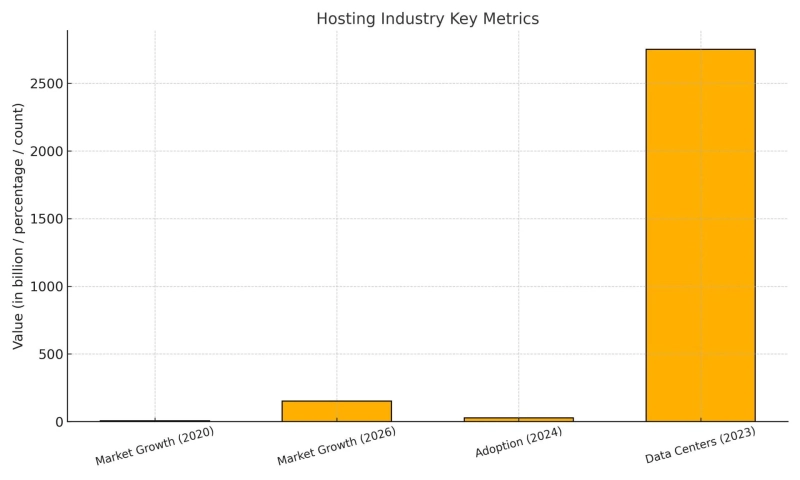Web hosting is the backbone of any online presence. But as your website grows, shared hosting or other hosting solutions might not be enough to meet your needs. That’s where dedicated server hosting comes in—a game-changing hosting option that offers superior performance, security, and control.
Whether you run a high-traffic e-commerce site, manage enterprise data, or host an active gaming community, understanding what a dedicated server is and who needs one is essential to ensuring your website or application operates at peak performance.
This blog is your ultimate guide to dedicated hosting. We'll explore what it is, how it differs from other hosting options, its benefits, and who should invest in it—all while providing actionable insights to help you make the right decision.
Dedicated Hosting Statistics
Market Growth
- By 2026, the global hosting industry will be worth $152.7 billion, with dedicated hosting growing at an 11.1% CAGR.
- In 2020, the dedicated hosting market reached $6.53 billion.
Adoption and Usage
- Large enterprises dominate the adoption of dedicated hosting, often opting for its high security and performance.
- By 2024, dedicated hosting will account for 27.90% of the hosting market.
Operating Systems
- Linux-based servers lead the market due to their cost-effectiveness and scalability, while Windows servers remain popular for specific software requirements.
Data Centers
- The U.S. leads in data center density, with 2,751 centers in 2023, contributing to the hosting industry’s expansion.
Source: Dedicated Hosting User Statistics 2024 [Market Growth]
What Is Spain Dedicated Hosting?
At its core, spain dedicated hosting means you have an entire physical server exclusively for your use. Unlike shared hosting or virtual private server (VPS) hosting, a dedicated server isn’t split among multiple users. Instead, all the processing power, storage, and network resources are completely allocated to you.
Notable features of dedicated hosting include:
- Full control over server configurations, including operating systems, software, and settings.
- Superior performance security since there are no co-tenants sharing resources.
- The capacity to handle mission-critical tasks or high-traffic websites without interruptions.
Businesses that demand seamless user experience and ultra-reliable hosting environments often turn to dedicated server hosting for its unparalleled stability and scalability.
How Does Dedicated Hosting Differ From Other Hosting Types?
Choosing the right hosting environment depends on understanding the differences. Here’s how dedicated hosting compares to other popular options.
1. Shared Hosting vs. Dedicated Hosting
Think of shared hosting like living in a dormitory—everyone shares the same space and resources. While it’s cost-effective for small websites, shared hosting doesn’t offer the performance or flexibility needed for growing sites.
Comparison Between Shared Hosting and Dedicated Hosting
Shared Hosting
- Resources are shared among multiple users.
- Limited control over configurations.
- Suitable for small, low-traffic websites.
Dedicated Hosting
- Exclusive resources for one client.
- Full control over software and hardware.
- Ideal for high-traffic websites and applications.
With dedicated hosting, you gain complete independence, like owning your own house instead of sharing an apartment.
2. VPS Hosting vs. Dedicated Hosting
VPS (Virtual Private Server) hosting offers a middle ground. It isolates virtual resources within a shared server, providing more flexibility than shared hosting but without the full advantages of a dedicated server. Think of VPS hosting as an apartment—while it’s private, the overall building is shared.
However, VPS hosting may still struggle to support mission-critical applications or websites with very high traffic. Dedicated hosting becomes the ultimate choice when resource demands exceed what a VPS can handle.
3. Cloud Hosting vs. Dedicated Hosting
Cloud hosting allows dynamic scalability where resources grow or shrink based on demand. It’s like living in a shared co-working space where everything seems flexible and instant.
Dedicated servers, on the other hand, act as your private residence—fully isolated, offering absolute resource control and unmatched consistency in performance. While cloud hosting works well for variable workloads, dedicated hosting services are better for stability and predictability.
Benefits of Dedicated Hosting Services
Investing in dedicated hosting unlocks a wealth of benefits for businesses that demand premium performance and control.
1. High Performance
Unlike shared servers, where resources are split among various users, dedicated hosting provides exclusive processing power and ensures blazing-fast load times and low latency. The result? A smooth user experience even during peak traffic.
2. Customization
With a dedicated server, you can customize the hardware, operating systems, and server configurations to meet your specific needs. Whether you’re running resource-intensive software or a unique application, dedicated hosting allows for tailor-made solutions.
3. Reliability
Shared hosting struggles under high traffic, but dedicated hosting guarantees consistent uptime and performance. This reliability is critical for mission-critical websites or apps.
4. Advanced Security
Hosting on a dedicated server eliminates the risk of co-tenant vulnerabilities. You can enforce custom security measures and maintain compliance with standards like HIPAA or PCI DSS.
5. Dedicated Support
Premium support often accompanies dedicated servers, giving you access to experts who can assist with troubleshooting, updates, and configurations.
6. Long-Term Cost-Effectiveness
While the upfront costs of dedicated hosting may be higher, businesses benefit from cost savings in the long run through better performance and reliability, which reduce downtime and potential revenue loss.
Who Needs a Dedicated Hosting Server?
Wondering if dedicated hosting is the right fit for your business? Here are some common use cases where investing in a dedicated server is a smart decision.
- High-Traffic Websites: When your website consistently attracts thousands (or millions!) of visitors, shared hosting won’t cut it. Dedicated servers handle high traffic with ease.
- E-Commerce Platforms: Online stores processing sensitive customer data require enhanced security and fast load times to ensure seamless user experiences.
- Federated Organizations: Enterprises dealing with sensitive proprietary, medical, or financial information need robust security and compliance measures.
- Custom Software Development: Businesses or developers running custom programs rely on the flexibility and control of a dedicated server.
- SEO-Driven Websites: High-performing, fast-loading websites often lead to better rankings. Dedicated hosting supports optimal user experience, which search engines reward.
If your website or business requires high reliability, advanced security, or resource-heavy tasks, dedicated hosting answers the call.
How to Choose a Dedicated Hosting Provider
Selecting the ideal dedicated hosting provider makes all the difference. Here’s what to look for:
- Understand Hosting Needs: Identify your performance requirements, software preferences, and website traffic levels.
- Scalability Options: Ensure the provider can support your growth while maintaining performance.
- Uptime Guarantee: Look for hosting providers offering at least a 99.9% uptime guarantee.
- Security Measures: Check for advanced security features like DDoS protection and encryption.
- Dedicated Support: Reliable customer support is invaluable—prioritize providers offering 24/7 assistance.
- Cost and Add-Ons: Compare pricing plans while factoring in features like automated backups and redundancy.
Top-rated hosting providers often bundle value-added services, making it easier to manage your server and business needs simultaneously.
Read more: How to Choose and Utilize a Dedicated Server in Spain
Common Myths About Dedicated Hosting
Despite its advantages, dedicated hosting is often misunderstood. Here are some misconceptions to watch out for:
- “It’s always expensive!” Truth: While it costs more upfront, the long-term ROI often outweighs the investment.
- “It’s too complicated to manage.” Truth: Many providers offer managed hosting options to simplify operations.
- “Only large businesses need it.” Truth: Small and medium enterprises with specific performance needs also benefit tremendously.
Dedicate hosting is for any business or individual that values reliability, security, and unparalleled control.
Why Dedicated Hosting Could Be Your Game-Changer
When success hinges on performance, security, and customization, dedicated hosting rises to the challenge. From handling high traffic to ensuring sensitive data protection, the benefits of a dedicated server are undeniable.
If your business is ready to take control of its online presence with maximum efficiency and stability, it may be time to make the switch. Do your research, assess your needs, and prioritize hosting providers with strong reputations for reliability and customer service.
Unlock the full potential of your website with dedicated hosting—an investment that pays for itself in uptime, user satisfaction, and peace of mind.
FAQs For Dedicated Hosting:
1.What is dedicated hosting?
Hosting where a physical server is allocated exclusively to one client, ensuring full control and performance
2.Who needs a dedicated hosting server?
High-traffic websites, e-commerce platforms, and businesses with advanced security needs.
3.Is dedicated hosting worth it?
Yes, for businesses requiring high performance, reliability, and scalability.
4.How is managed hosting different from dedicated hosting?
Managed hosting includes server maintenance by the provider, while dedicated hosting gives clients full control.
5.What is multi-server management?
Managing multiple servers simultaneously for greater reliability and availability.
6.What is RAID storage space?
A technology combining multiple drives for improved performance and redundancy.
7.What is the purpose of a dedicated server?
To provide businesses with high performance, security, and customization.
8.How is dedicated hosting different from VPS hosting?
VPS shares a server among virtual partitions, while dedicated hosting offers an entire server for one client.
9.What is the major downside of dedicated hosting?
The high cost and technical expertise required for management.


